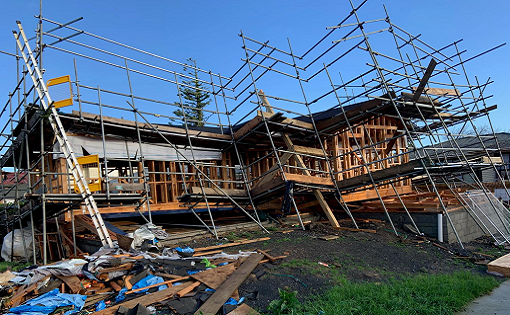We’ve had a number of queries recently from builders (and it’s a regular question) asking what happens if their customer doesn’t arrange contract works insurance on a renovation or alteration.
As most of you should know by now, when a project involves working on an existing structure the contract usually requires the homeowner to take out contract works insurance. This is for very good reasons:
- The policy should ideally be arranged with the same insurer as the existing structure, so there aren’t two insurers fighting over what’s covered by who and there aren’t two excesses to pay
- It prompts the homeowner to contact their insurer to let them know work is being done. Failure to do so could void cover on the existing structure, as having building work done is a material change to the risk being insured
Because we urge builders to always obtain confirmation from their customers that the contract works insurance has been arranged (and get a copy of the certificate), we often get asked why they should bother. Surely, if the homeowner hasn’t arranged the cover then it’s their problem if there’s a claim?
Unfortunately, it’s not that simple! Imagine a scenario where a worker or subbie has left a tap going or sparked a fire, or any number of other situations have arisen where damage has been caused by the contractors. Do you think the homeowner is going to accept responsibility to pay all the repair costs just because they haven’t arranged the insurance? Or is it more likely they are going to blame the builder and say it’s your problem since you caused the damage? Plus, what does your contract say is the penalty if they fail to arrange the insurance? Probably nothing. So, contractually where does that leave you?
Homeowners usually fail to arrange the insurance for a number of reasons:
- They don’t read the contract and don’t realise this is something they need to do
- They make enquiries with their insurer but the process is too hard (or it’s too expensive)
- They’re trying to save money and don’t want to pay for it
- They rationalise that it should be the builder’s responsibility and so don’t do anything
Even if they do arrange it, they also need to extend and amend it as/when the project increases in scope or is delayed.
Recommendations
- Clearly communicate that they are responsible for arranging insurance for the job – click here for a copy of a helpful flyer for homeowners, explaining what it is all about
- Make sure you obtain a copy of the insurance certificate before you start work
- Diarise the policy expiry date, so you can remind the homeowner to extend/amend the cover if the project scope or timeline is extended
- Add a clause to your contract that sets out the penalty if the homeowner fails to arrange cover (ie. that they are responsible for all the costs if there is an event that would have been insured, regardless of the cause)
If it’s a small job do they still need to arrange cover?
One common house insurance policy explains what is not covered:
Part of the house being constructed, de-constructed or undergoing alterations and not suitable for permanent residential use or occupation
It also goes on to say what is excluded:
Structural alterations or additions
- There is no cover for any loss or damage caused directly or indirectly by the following events:
i structural additions or structural alterations, unless we have been notified of the additions or alterations beforehand and we have agreed in writing to cover this, or
ii water in any form (including hail and snow) entering your house because any roofing material, exterior cladding, window or door has been removed by:
a) you, or
b) any other person, who is acting on your authority.
However, another one provides automatic cover, up to certain limits, for minor alterations, specifically non-structural renovations that don’t require a building consent. Their cover states:
House under minor alteration
We’ll cover:
- your house while it is under minor alteration
- building materials you own that were specifically purchased for the minor alteration and stored at your house.
Minor alteration is any non-structural renovation or building work to your existing house that does not require a building consent from your local authority.
We pay this benefit in addition to your sum insured.
Limits
We’ll pay up to $10,000 for each event.
We’ll only cover plumbing or electrical installations if they are carried out by or approved by a qualified tradesperson.
We do not cover any loss for building, alteration or renovation work that requires or involves any of the following:
- a building consent
- lifting or shifting of the house
- load bearing walls
- excavation greater than one metre deep
- piles or foundations
- structural alterations or repairs including the removal or alteration of the roof or cladding.
Basically, that means the homeowner should ALWAYS check with their insurer, knowing that some insurers will automatically minor works, but others may not.
In a Nutshell
If your customer is responsible for arranging the contract works insurance make sure you see a copy of the insurance certificate before you start work, so you can ensure it is properly arranged (you’re named on it and the contract value, dates and allowances are correct). It means you can also diarise to remind them to extend it if the project runs over. Add a clause to your contract that explicitly states the homeowner is responsible for all costs that would have been covered by contract works insurance if they have failed to arrange it (even if that damage was caused by you – it would still have been insured).




